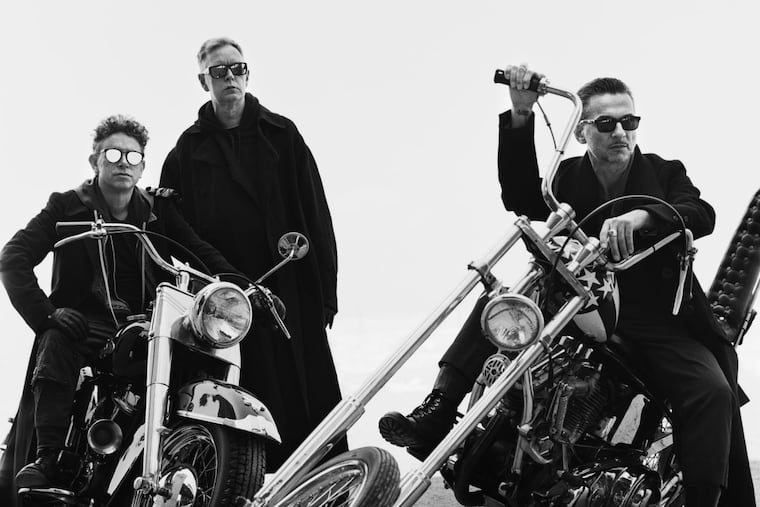Depeche Mode don't think their music can change the world. That won't stop them from trying
"See, you're no righter of wrongs, lest you turn into a superhero, but you try to always fly on the right side of history," says Gore.

As audiences will witness during Sunday's gig at Wells Fargo Center, Depeche Mode have gone far beyond the twee-pop electronica of its first album, Speak & Spell. Since that spare 1981 debut, principle songwriter/guitarist Martin Gore has with each passing album brought the dark electronic trio further into the harsh lyrical reality of sex, anxiety, religion, malaise, aggression, and social unrest, increasingly with a bleak, and yet somehow simultaneously hopeful, edge.
Look at their current tour's set list, and haunting hits such as "Personal Jesus," "Enjoy the Silence," and "Walking in My Shoes" are there. But more and more, political dilemma and radical protest has become a steady part of Depeche Mode's diet. The planet's socio-political landscape and the worries of the weary masses get a hard look on Depeche Mode's 2017 album, Spirit.
"I'm looking at the world as a whole," says British-born Gore from his home in Santa Barbara. "This is the mess I'm seeing."
On songs such as "Where's the Revolution?" ("You've been pissed on / For too long / Your rights abused / Your views refused / They manipulate and threaten / With terror as a weapon / Scare you till you're stupefied"), Gore and singer David Gahan are simply unable to turn away while the world crumbles. They rage accordingly.
These viewpoints make the alt right's embrace of Depeche Mode — Richard Spencer refers to himself as a lifelong fan — all the more curious. Depeche Mode has denounced the white supremacist group's adoption of the band.
"Look, we've had the Syrian crisis for years," says Gore, considering things worth protesting — in song and on the street. "That's unbelievable to see those horrors daily, just as it is their refugee crisis. The Middle East has collapsed. America has its violence against blacks — people doing nothing, but having their hands in the air — as cameras watch. Everywhere you look… The more the earth splinters apart, the more difficult it is to function without speaking out."
Gore grew up in Basildon, a town in Essex, England, but his political viewpoint has been of a West Coast-er.
"You can't ignore what goes on around you wherever you are," he says. "Yes, I've lived most of my life as a European, though I won't be able to say that for much longer. I could never have predicted that, but the writing has been on the wall for a while—so was the potential of Trump's election. Only now it's crazier that he's won and implementing all the crazy ideas he said he would."
This might sound like a turnaround from a man who wrote the coolly emotional likes of "A Pain That I'm Used To" or the sensualist "Stripped," to the accompaniment of a richly atmospheric and industrialized brand of electronic post-punk.
Yet, for fans intimately entrenched in the trio's icy remove and Euro-centric soundscapes, Depeche Mode has always had its socio-political agenda. Going as far back to 1983's Construction Time Again, Depeche Mode has used lyrics geared toward activism, labor, or anti-corporate discourse in tracks like "Get the Balance Right," "Everything Counts," "The Landscape is Changing" or "Monument."
"See, you're no righter of wrongs, lest you turn into a superhero, but you try to always fly on the right side of history," says Gore. "You write what you believe in, what you trust."
In taking about Spirit's lyrical themes, he didn't want to come off as preachy; nor did quavering baritone vocalist Dave Gahan, who has been writing Depeche Mode-songs for the last 13 years. With Spirit, Gahan's thrown his revolutionary two cents in the Depeche Mode songwriting ring with themes similar to Gore ("The songs that Dave's put forward are the best he's written," says Gore).
"This time around," says Gore "and always, really, we want people to think when they listen to our records. Maybe, this time, it was just more pointed. I really felt during the writing process for Spirit that the world was in a complete mess. Humanity had lost its way. By pointing that out, maybe you could somehow get some sort of values back. Now, I may just be imparting too much importance to music and what it can do—I don't know if it can change the world—but even if one person is affected, then maybe I've achieved something."
MUSIC
Depeche Mode
7:30 p.m. Sunday, Wells Fargo Center, 3601 S. Broad St., $29.50-$129.50, wellsfargocenterphilly.com